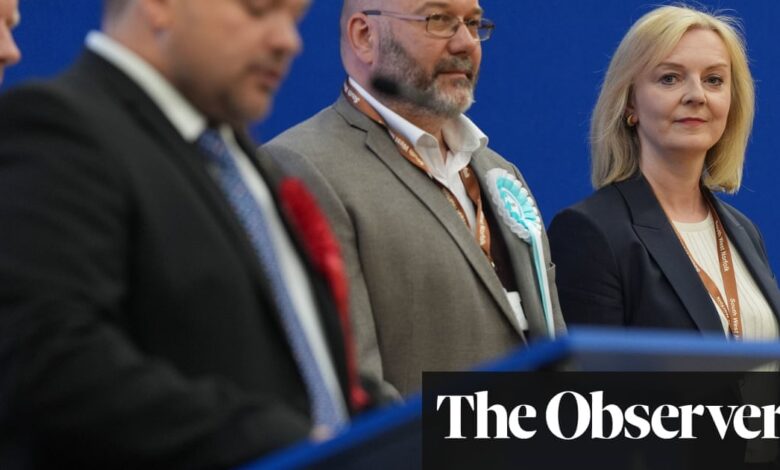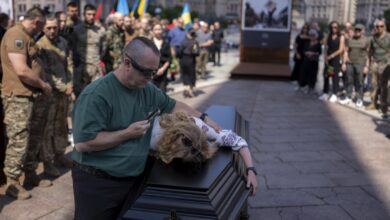‘She wasn’t sure how to get off the stage’: Liz Truss’s ungracious count retreat caps political humiliation | Liz Truss

[ad_1]
Very early on Friday morning, Liz Truss, a politician whose weapons-grade inability to read any room almost bankrupted the nation, appeared unable even to choreograph her own demise. The last minutes of her time in office as an MP were as clumsily inept as much of the previous 14 years of vapid careerism. To begin with, after a brief recount in her South West Norfolk constituency, her fellow candidates were kept waiting on stage for an age while, it appeared, the former PM was outside in a Range Rover with her expensive security detail presumably debating if she might stay behind the tinted glass and avoid the fatal moment for ever.
When she did finally appear through an unexpected side door, following a slow handclap, she stood with characteristic awkwardness to hear the fact that she had somehow, in five catastrophic years – or 49 fatal days – translated a 26,000 Tory majority into a 640-vote defeat. Her victorious Labour opponent, Terry Jermy, gave a heartfelt speech about his win, and the stage seemed set for Truss to offer some kind of response, or explanation, or at least the traditional thank you to tellers and supporters. She looked panicky for half a moment, perhaps with this thought in mind, before scuttling away ungraciously.
Afterwards I asked the velvet-breeched high sheriff who had conducted the announcement if Truss had indicated that she wanted to speak. “No,” he said. “I think she just wasn’t sure which way to get off the stage.”
In an election night overstuffed with Portillo moments – Shapps! Coffey! Mordaunt! Rees-Mogg! – this one provided the final and most fitting sense of closure to some of the least distinguished years in British political history. I happened to be staying for the count in King’s Lynn at a once-grand hotel in which Robert Walpole, the first prime minister and the longest serving, celebrated many electoral triumphs. The tenure of his shortest-serving successor ended in contrastingly banal surroundings, a couple of miles up the road, on the badminton courts of the Lynnsport leisure centre, a venue that might have featured in one of Alan Partridge’s fever dreams.
After successfully locating the exit, Truss gave the BBC her airy take on why she thought the people of Downham Market and Thetford and Swaffham and Methwold had rejected her, ending 60 years of untroubled Conservative victories in the constituency. You might have imagined her argument would be at least prefaced by some reference to the fact her emergency budget had sent the pound crashing to its lowest-ever level and created a £30bn black hole in the economy overnight, casting her as the least popular prime minister in living memory. Instead, of course, she doubled down on the rhetoric that fuelled her risible “comeback” book, Ten Years to Save the West: “The issue we faced as Conservatives was we haven’t delivered sufficiently on the policies people want. That means keeping taxes low, but also … things like the Human Rights Act that made it very difficult for us to deport illegal immigrants.”
It’s interesting to note that not even the Reform candidate in this election, an adult education manager for Norfolk council, Toby McKenzie, cites small-boat immigration as the first issue in his stealing 9,958 votes from Truss here. Instead he suggests that the MP was out of touch on local issues that mattered. “The big thing for me on the doorstep,” he said, “has been the megafarm that is planned near some of the villages here … an absolutely massive site for chickens and pigs. Liz Truss has failed to [campaign to] block it. We are talking thousands upon thousands of animals just a mile away from two villages. Imagine the stench. Pigs are bad enough. But chickens too. She was very much for it,” he said. Before adding, conspiratorially: “And word spreads in Norfolk.”
Truss’s defeat looked like a microcosm of the existential crisis that her party faced in this election and which will define it in the weeks ahead. Her vote was squeezed not only by the populist message of Farage’s party but also by remnants of the remainer centre-right that Truss so shamelessly abandoned after the EU referendum. One nation Tories have been all but purged from the parliamentary party, but there was a well-organised cell of that tradition that took some calculated revenge here.
after newsletter promotion
Local landowner James Bagge (who has the kind of old-school name you hear pronounced three ways), a former army officer and barrister who worked for the serious fraud squad, has led the “turnip Taliban” opposition to Truss ever since she was fast-tracked into her safe seat by David Cameron in 2009. This time around, urged to run by fellow Old Etonian Rory Stewart, Bagge stood as an independent, trimming another 6,282 votes from her total by giving true blue constituents “a trustworthy place to go that wasn’t Labour or Reform”.
He was supported in the most urbane of guerrilla campaigns by those benign ghosts of Conservative past, Dominic Grieve and David Gauke. Bagge is pointedly unrepentant that he effectively helped Labour defeat Truss. He had been, he said, fighting above all for “what has gone [from the frontline party]: honesty, accountability, being genuine. One of the things that has undermined trust so badly is ministers endlessly coming on television and defending indefensible lies. And offering very simplistic solutions to intractable problems”.
Bagge is too polite quite to say so, but he is affronted by the way that Truss refused to attend the only hustings in the constituency, in the town hall at Downham Market, tweeting instead images of herself watching an England match in a local pub. Others have tales of her being hustled by her security out of a local chip shop when things got testy, and last week shouted out of the Whalebone IInn, a Wetherspoons, at breakfast time.
Her apparent inability to recognise that she may be among people whose mortgage payments she had trebled, and whose pensions she has hollowed out, was a source of baffled fascination to all her opponents.
In her campaign literature, without irony, Truss insisted that she was “running on her record in government”. For once, she was taken at her word.
[ad_2]
Source link




